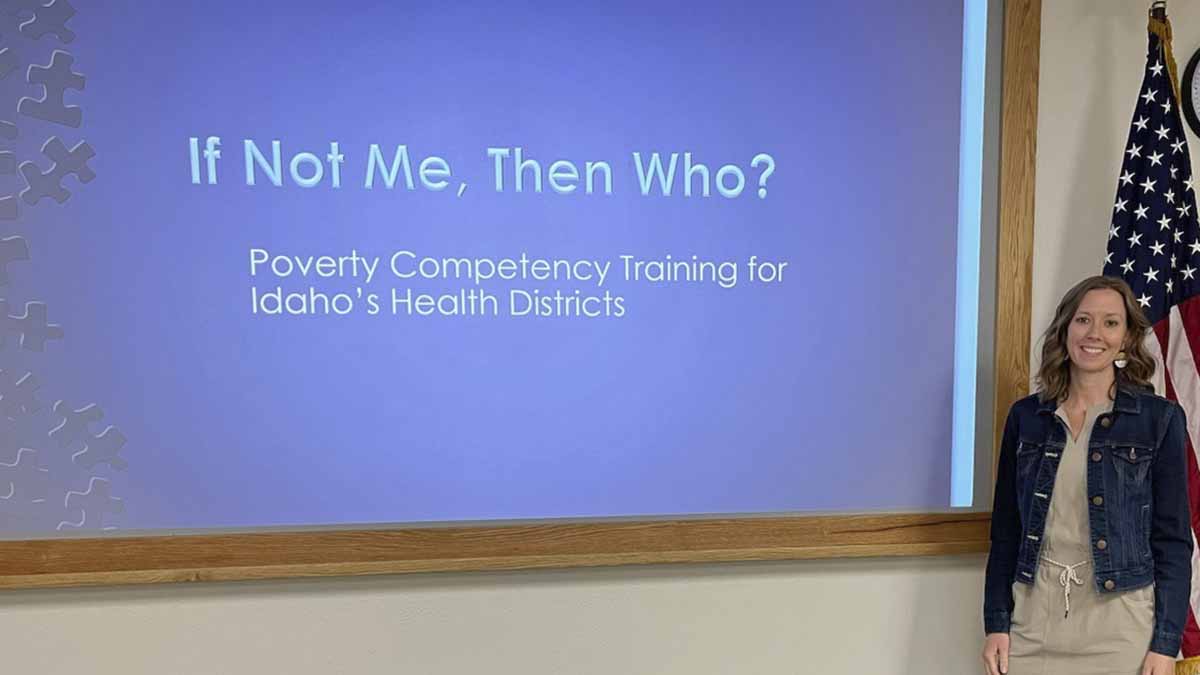Coaching Poverty Competency
May 29, 2024
A University of Idaho Extension team is training health partners throughout the state to better recognize and remedy latent biases hindering how well they serve the 43% of Idahoans whose incomes are insufficient to cover basic needs.
UI Extension’s certified poverty coaches have also been providing poverty competency training to colleagues in other Extension programs to ensure their approaches toward assisting people experiencing poverty are based on facts and science rather than myths and stereotypes.
Lindsey McConnell-Soong, Extension Collaborative on Immunization Teaching and Engagement (EXCITE) program manager; Tasha Howard, UI Extension educator for Canyon County; and Joey Peutz, UI Extension educator for Payette County; are the program’s leads and were the first within UI Extension to complete training through a consulting firm devoted to breaking the cycle of poverty in America, called Communication Across Barriers.
UI Extension received $100,000 over 18 months through EXCITE to implement an immunization education campaign. The USDA National Institute of Food and Agriculture and the Centers for Disease Control and Prevention collaboratively created EXCITE in response to the COVID-19 pandemic, seeking to establish a nationwide adult immunization program.
A major barrier affecting vaccination rates among low-income residents is the lack of understanding about poverty among Idaho health care providers. McConnell-Soong, Howard and Peutz have worked closely with the South Central Public Health District and Southwest District Health, where they’ve trained 132 staff members to adapt poverty-informed outreach strategies.
“Part of what we’re hoping to coach local health department staffs in is recognizing how to identify those barriers that people are facing and be able to then assist them in finding the resources that might not be directly related to immunization but do act as barriers in keeping up with health factors,” McConnell-Soong said.
People living in poverty face countless barriers that are often overlooked by healthcare providers that make leading a healthy lifestyle more challenging, such as income level, lack of transportation, lack of healthcare access and poor access to healthy food.
“We’re offering health departments a lens through which to do their work with this population of low-income Idahoans. They’re one of the hardest populations to reach and have success with,” McConnell-Soong said. “When we come at something from a middle-class framework and lens, we can’t develop something through that lens for people who aren’t living in that space.”
Those who complete the training often acknowledge discovering biases about people living in poverty they were previously unaware they possessed. For example, it’s a common myth that parents living in poverty fail to feed their children a wide variety of fruits and vegetables because they lack knowledge about a healthy diet. In truth, many of them can’t afford to experiment with foods their children might simply throw away, or they might not have access to stores with a good selection of fresh produce.
“Most people generalize or base their knowledge of individuals living in the crisis of poverty on what they see and hear from the media,” Peutz said. “Many myths can be dismissed with evidence-based facts.”
Both participating health districts have changed approaches in response to the training.
“We’ve seen health districts adjust and think through their processes to really support and be accessible to someone living in poverty,” Howard said. “For someone in the war of poverty, making health decisions might not be the top priority, so digging into the details and experiences of those who live in poverty helps health educators understand how best to provide support.”
UI Extension has received many additional requests for poverty training from other health care providers in response to the success of the EXCITE program. Using internal Extension dollars, 10 additional poverty coaches have been trained to continue the program, bringing the total number of certified coaches to 13.
Training sessions can range from two to eight hours in duration. McConnell-Soong provided a four-hour training session to about 20 participants from Western Idaho Community Health Collaborative, which represents several area health agencies. In mid-May, McConnell-Soong and Peutz presented about poverty coaching at the 2024 National Health Outreach and Engagement Conference in Greenville, South Carolina. McConnell-Soong has facilitated a workshop on poverty and trauma for University of Nebraska-Lincoln's Expanded Food and Nutrition Education Program team. Leaders with a third of Idaho health district have also expressed interest in the training.
Within University of Idaho Extension, 16 staff members with the Digital Economy Program participated in an eight-hour poverty training. Several AmeriCorps workers involved in Extension efforts received an hour-long introductory poverty training, and AmeriCorps is mulling broadening the training to staff outside of Extension. They’ve also offered workshops to 4-H and Eat Smart Idaho staff. They’ve set a long-term goal of having every UI Extension employee complete a one- to two-hour poverty training webinar.
UI Extension previously implemented two other EXCITE programs that spanned from May 2021 through June 2023 which involved hosting 18 mobile vaccine clinics for agricultural workers.

About the University of Idaho
The University of Idaho, home of the Vandals, is Idaho’s land-grant, national research university. From its residential campus in Moscow, U of I serves the state of Idaho through educational centers in Boise, Coeur d’Alene and Idaho Falls, nine research and Extension centers, plus Extension offices in 42 counties. Home to more than 12,000 students statewide, U of I is a leader in student-centered learning and excels at interdisciplinary research, service to businesses and communities, and in advancing diversity, citizenship and global outreach. U of I competes in the Big Sky and Western Athletic conferences. Learn more at uidaho.edu.






